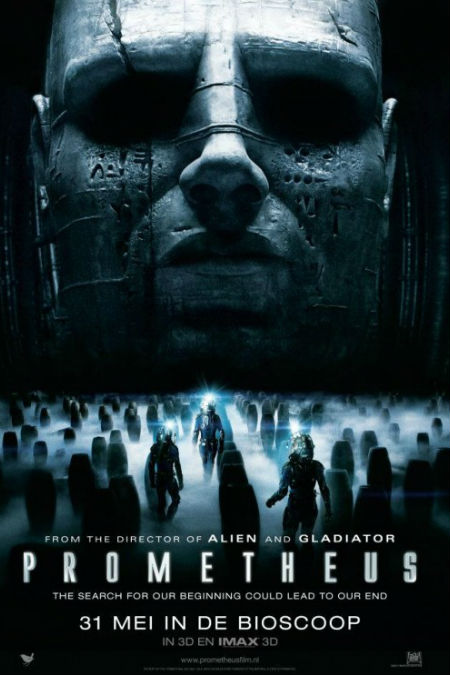
Prometheus is a movie with grand ambitions.
That much is evident from the succession of operatically bold trailers that have swept across the internet in the months preceding the release of this movie, promising a movie of grand vision, lush visuals and heart-pounding action.
And it is true that Prometheus has all this and more. It could be argued that the trailers have given away a little too much of what’s in store for those eagerly awaiting, for what is for all intents and purposes, a prequel to director Ridley Scott’s first and much-acclaimed sci-fi masterpiece, Alien, in 1979. Even so, they have more than amply delivered on their mandate, which is to present the movie as a more than worthy successor (and at the same time, predecessor) to the classic that first introduced to this dark and terrible universe.
The good news is that for the most part Prometheus delivers on the seductive hype that has come before it like a procession of courtiers heralding their returning king.
Ridley Scott has found a new kick-ass feminist heroine in Noomi Rapace as Dr Elizabeth Shaw, best known for her role as Lisbeth Salander in the Swedish movies based on Stieg Larsson’s best-selling series of books, who picks up the intimidating mantle of the legendary Sigourney Weaver who played Ripley in Alien, and more than ably carries it aloft. She is a heroine with lofty ideals, and unstinting belief, who even at the end of the movie, with everything she believed hanging in bloodied threads around her, carries on with her quest for knowledge, her thirst for answering the question “why are we here?” undiminished. She is an impressive character and another entry in the canon of tough female characters, who can handle themselves in any situation without anyone’s help, thank you very much, so beloved by Ridley Scott.
The other major character who dominates the movie but with a brooding menace, is David (Michael Fassbender), an artificial human being, or “robot”, spat out as a pejorative by Elizabeth Shaw’s character in the aftermath of the adrenaline-pumping climax (and you knew there had to be one so that’s hardly a revelation), who initially appears as the shepherd of the flock. He tends to the crew while they are in status on the just over two year, 500 million kilometre journey from Earth , learns ancient languages so he is ready to communicate with whoever it is they encounter on the planet that Shaw, and her lover and colleague, Charlie Holloway (Logan Marshall-Green) believe holds the secret to the origins of the human race, and acts in every way as the perfect servant to the crew around him.
But as the movie goes on, it becomes evident in a furtive glance here, a subtle gesture there, and then later some brazen acts of cold, unfeeling calculation (for of course he has no emotions) that he has an agenda that cares little for the people who are depending on him. Michael Fassbender plays him beautifully, his icy detachment from anything even remotely human a perfect counterpoint to the very real flawed people around him who are the usual mix of pragmatic realists, corporate sellouts and true believers.
And it is the true believers who provide the movie’s reason for being. Both Shaw and Holloway have gone on this mission to a forbidding alien world believing that a series of identical pictograms, hieroglyphics and cave paintings from civilisations around the world separated by geography and time, are invitations from their benevolent makers to journey home to the stars and meet the beings who gave mankind breath.
They are fervent believers in this quest to find humanity’s origins, and the almost naive purity of their beliefs contrast starkly with the pragmatic cynicism of many of the other characters, particularly Charlize Theron as Meredith Vickers, brutally pragmatic representative of the Weyland Corporation which is funding the mission to the tune of a trillion dollars, and Sean Harris as the geologist, Fifield who is simply onboard “to make some money”.
Ridley Scott though clearly sides with the true believers devoting much of the movie’s intellectual energy, and refreshingly for a Hollywood blockbuster, it actually has some, to sweeping noble questions of the nature of life and death, the dawn of man, and whether finding out who created us is a worthy pursuit or a fool’s errand. It lends the film a certain moody gravitas which suits it to some extent and melds seamlessly with the dimly lit but visually powerful look of the film. This is a movie meant to be taken seriously even as you recoil from the many inevitable horrors visited upon our intrepid expeditioners.
It largely succeeds in that aim although at the expense of a sense of building tension at times, and a finale that, while it hits all the right dramatic notes, feels like a series of connected but separate acts rather a breathtaking operatic moment building to a stunning crescendo.
It is an impressive movie, and a worthy addition to the Alien canon, and while Ridley Scott is to be applauded for making a movie that combines deep philosophical questions, lush visuals, and the unsettling sense that our quest to meet our makers could end in our doom, the screenplay feels a little fractured, and the characters a little too broadly drawn.
Having said all that, I found myself utterly drawn into the movie which as treatises on the nature of existence go, makes one hell of a thrill ride through the cosmos.